Our extra-large special edition is here. Subscribe today and receive the 25% longer issue at no extra cost!
The Best And Worst Industry Marketing Moments
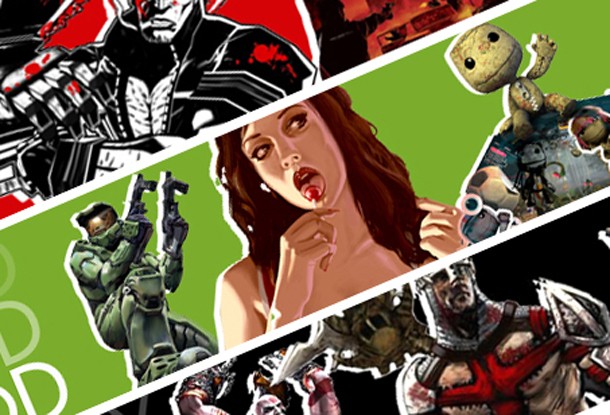
The video-game industry is notorious for using outlandish marketing stunts to promote games. While some reflect the creativity of the industry, others make you wonder who thought they would be a good idea. From black cats to bees, and goat guts to chicken livers, we present the good, the bad and the ugly of video-game marketing. 
Wanted: Your Attention
Rockstar (GTA IV)
Wanted posters appeared on telephone poles across Brooklyn with Niko Bellic’s mug to promote the highly anticipated GTA IV. A Web site, libertycitypolice.com, which now links to Rockstar’s site, and a tip line, [email protected], were listed to assist with his capture. For those who e-mailed the tip line, an auto response from the Liberty City Police was sent back stating: “We are all presently out to lunch at the moment, but will get back to you when we get around to it.” Cats Spread Fear Around London
Cats Spread Fear Around London
Warner Bros. Entertainment (F.E.A.R. 2: Project Origin)
On Friday, Feb. 13, 2009, trained black cats were let loose in the
streets of London sporting jackets emblazoned with F.E.A.R. 2 to advertise the game. Nothing says fear more than small black cats in jackets. Fans were given the opportunity to contact Warner Bros. and request the tiny F.E.A.R. 2 jackets for their own pets. As far as the walking advertisements, the cats were under supervision and none were harmed.
Guerrilla Marketing With Sledgehammers
THQ (Red Faction: Guerrilla)
A strategically placed parked car in London was filled with 100 copies of Red Faction: Guerrilla with a sledgehammer chained to the vehicle. Hundreds of people intrigued by the spectacle passed; some picked up copies of the game, others wanted to beat the hell out of the car with the sledgehammer. Who doesn’t want to beat the hell out of a car with a sledgehammer?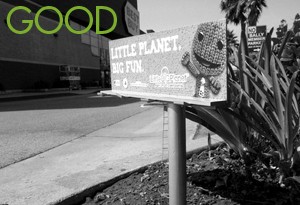 Little Big Billboards
Little Big Billboards
Sony (LittleBigPlanet)
One hundred tiny billboards featuring Sackboy sprung up on the streets of Los Angeles, San Francisco and New York, complete with working lights and tiny ladders. These Little Big Billboards were each about the size of a small yard sign. As expected, some were swiped and put on eBay, which further padded the hype and some lucky dude’s bank account.
I Love Bees
Microsoft (Halo 2)
One of the most memorable marketing techniques of all time, I Love Bees was an alternate reality game (ARG) created as part of the viral marketing campaign for Halo 2 in 2004. The site, ilovebees.com first appeared as a quick flash at the end of the Halo 2 trailer. When entering the site, the user is directed to the homepage of a honey company, which is quickly interrupted by an eerie message. Players investigated the site malfunction through clues as part of the game, which at the end led them to four movie theatres across the country. There they received special items including a commemorative DVD, and were the first in the world to try Halo 2 multiplayer.
Naming Kids After Dinosaur Hunters
Acclaim (Turok: Evolution)
Acclaim held a Labor Day contest in conjunction with Turok: Evolution. One of several name-your-seed-after-something-game-related promotions, the first baby born on Sept. 1, 2002, and named Turok won $10,000. Not only is the name bad, but imagine finding out your parents named you after a mediocre game while another baby beat you to the cash.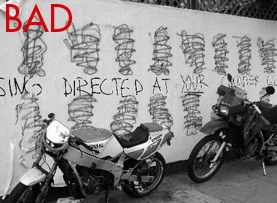 Paint The Town PSP
Paint The Town PSP
Sony (PSP)
In 2005, Sony hired graffiti artists in major urban cities across the country to spray paint buildings with images of bleary-eyed kids with PSPs. Though Sony did ask permission and paid building owners for the ad space, the stunt still received a backlash from the urban demographic it was reaching toward. There were complaints that Sony was plaguing their cities with unflattering images that were supposed to represent urban culture, but failed. City dwellers showed their contempt by spraying over images with words like “Fony.”
Speed For Free
Acclaim (Burnout 2: Point of Impact)
Acclaim offered to pay all speeding fines in the UK for one day to promote a game notorious for reckless driving and the occasional property destruction via vehicle. A spokesperson stated Acclaim did not promote speeding; rather, they simply wanted to help ease the financial pain of speeding tickets. The UK government objected and the promotion was canceled. Lucky day for pedestrians.
Assault Weapons As Swag
EA (The Godfather II)
To promote The Godfather II, journalists across the country
received authentic brass knuckles. EA probably should have checked in with their legal department on this one, since those items are prohibited in some states. As expected, there was a recall on the assault weapon. To be fair, there’s probably no better way to give journalists the true criminal experience without a little jail time.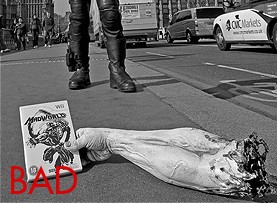 What Happens When You’re Armed
What Happens When You’re Armed
Sega (MadWorld)
Bloodied prosthetic arms were scattered around London painted in MadWorld’s monochromatic style, complete with texture and veiny detail. The arm looked freshly ripped out of the socket of an incredibly large man holding a copy of the game. Though some folks were offended by the limbs cluttering their streets, a Sega Europe spokesperson assured there was a team of people monitoring each arm. If anyone was offended it was immediately removed. The arms actually look pretty cool and would have made a great addition to any room in your home.
Goat Guts As A Delicacy
Sony (God of War II)
European journalists were invited to a promotional event for God of War II and were in for a treat. The event had a mythological theme and as part of the set, a beheaded goat was unveiled, courtesy of a local butcher. It was alleged that hosts invited guests to reach inside the warm goat and eat offal from its stomach. Sony released a statement denying these claims, apologizing and admitting the dead goat was a poor decision. The goat was returned to the butcher at the end of the event. Body Snatchers
Body Snatchers
Capcom (Resident Evil 5)
Fans of the Resident Evil franchise were invited to explore London’s Trafalgar Square area for fake body parts. The rules: Grab as many limbs, heads and other miscellaneous parts and race back to the Westminster Bridge for a grand prize. The grotesque, realistic pieces were crafted with use of uncooked chicken livers for added gore. By the end of the hunt some of the limbs went missing. Looks like someone got away with a bag of rotting chicken bits.
Cocks Ruin Acceptance Speech
GameCock (Promoting, um, themselves)
At the Spike Video Game Awards in 2007, Ken Levine, BioShock’s lead designer, made his way toward the stage to accept the Game of the Year Award. Before even beginning his speech, two cocks, er, roosters, ran on stage and grabbed the mic to promote indie publisher GameCock. The speech was cut short and the audience was unamused. GameCock later apologized for their actions. What’s even uglier? Their costumes. Surprisingly, no roosters were harmed in the execution of this stunt.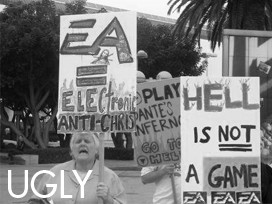 Staged Protest Turned Real Protest
Staged Protest Turned Real Protest
EA (Dante’s Inferno)
EA hired a group of 20 people to stand outside E3 to protest
Dante’s Inferno. The stunt was staged by a viral marketing agency hired by EA. The group claimed to protest the game because it glorified eternal damnation. Pamphlets were created and distributed, and picket signs that said “Hell is not a Game,” “Trade in your PlayStation for a PrayStation,” and “EA = Electronic Anti-Christ” with an image of Jesus with an “X” over it were in full effect. The entire protest was staged, and religious groups were offended. To these groups, EA does not equal Exceptional Advertising.
Tombstones As The New Billboard
Acclaim Entertainment (Shadow Man: 2econd Coming PS2)
In 2002, Acclaim announced that relatives of the recently deceased could contact them if they were interested in subsidizing costs of funeral expenses. The catch? An advertisement promoting the game Shadow Man: 2econd Coming for the PS2 would appear on the loved one’s tombstone. The company later passed it off as a joke after all of the negative attention it received; still, here lies Acclaim’s marketing credibility.

Get the Game Informer Print Edition!
Explore your favorite games in premium print format, delivered to your door.
- 10 issues per year
- Only $4.80 per issue
- Full digital magazine archive access
- Since 1991









